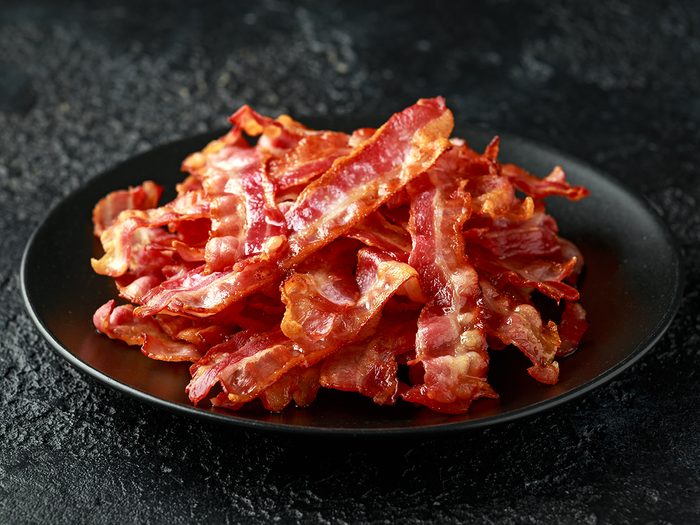I Ate Bacon Every Day for a Week—Here’s What Happened

Knowing the risks of processed meat, a doctor took one for the team by undergoing a seven-day experiment with this salaciously savoury breakfast meat.
Bacon comes from the belly of pigs, which is cured and smoked, giving it that irresistible scent and rich flavour. There’s more to the story than its iconic sizzle—bacon is frequently at the centre of health discussions. Backed by extensive research, the World Health Organization categorizes processed meats, including bacon, as Group 1 carcinogens. This means there are potential cancer risks with consistent, heavy intake.
Growing up, the sound of bacon crackling was an occasional treat. With a father who practiced family medicine and a mother passionate about nutrition (not to mention four hungry older brothers), we often opted for leaner turkey bacon over its pork counterpart.
As I began my week-long deep-dive into bacon consumption, I felt fond memories…but, as a trained family doctor who gained certification in nutrition coaching, I also felt some slight concern. My love for those crispy slices remains as strong as anyone’s, but I knew I’d have to pursue this wisely. Enriched with insights from experts at the Cleveland Clinic, here are the health effects I felt during my week of eating bacon.
Bacon nutrition facts
For this assignment, I leaned toward organic, uncured turkey bacon. The choice was a nod to potentially healthier alternatives, though turkey bacon is not without its own set of controversies (like its sodium content and the fact that it’s still processed meat, just to name a couple).
However, I did stray twice during the week: A weekend brunch beckoned with classic pork bacon, and I couldn’t resist a grilled chicken wrap with bacon as the signature ingredient that made it a Cobb dish.
Here are the nutrition facts for the turkey bacon I selected—note these values represent one slice:
- Total fat: 1.5 grams
- Cholesterol: 20 milligrams
- Sodium: 340 milligrams
- Total sugars: 1 gram
- Protein: 6 grams
To provide context, most of us are more familiar with the typical nutritional profile of regular bacon, primarily the kind served in restaurants. Laura Jeffers, MEd, RD, LD, a registered dietitian from the Cleveland Clinic, helped shed light on the matter:
- Protein: Both pork and turkey bacon offer substantial protein. For a 2-ounce serving, pork bacon delivers 20 grams, while turkey bacon isn’t far behind with 17 grams.
- Calories: Turkey bacon is slightly leaner, with 218 calories per 2-ounce serving, compared to pork bacon’s 268.
- Fat: Turkey bacon scores again with only 14 grams of fat versus pork’s 22 grams for the same serving size. However, both have considerable saturated fat—turkey has 4 grams and pork 8 grams. Saturated fats are linked to heart diseases.
- Sodium: Without choosing a reduced-sodium variety, you can easily surpass the daily recommended salt intake from just a few slices. The American Heart Association suggests less than 1,500 milligrams daily. Surprisingly, 2 ounces of turkey bacon carries over 1,900 milligrams, while pork bacon holds around 1,300 milligrams. High sodium doesn’t just elevate heart disease risks but also ups the chances of kidney stones.
- Vitamins: While both types provide B complex vitamins, pork bacon emerges superior. Pork also boasts more selenium, a mineral known to activate proteins that may prevent cancer. Zinc levels are comparable in both, playing a role in regulating gene activity.
Eating bacon every day for a week
With this knowledge, I began my week. The first two mornings saw bacon gracing the side of my plate next to scrambled eggs—but very soon, the allure started waning, nudging me to get innovative to see this challenge through.
Over the next few days, bacon adorned my salads and found its way into a classic BLT and grilled chicken wrap. I even ventured into making bacon-wrapped asparagus for something different to try.
The week culminated with a brunch at one of my favourite local restaurants, where I indulged in some traditional pork bacon. By this point, though, my enthusiasm for bacon had significantly waned—I was, quite frankly, baconed out.
When I ate bacon every day, I felt full
Eating bacon daily came with its revelations. Meals felt more filling. A definite fullness lingered, perhaps owing to bacon’s protein and fat content. I noticed that I stopped snacking as much—which was a major bonus.
When I ate bacon every day, I felt dehydrated
The second most noticeable effect was thirst. Post bacon meals—especially when I went out for brunch—I often found myself reaching for water more frequently. Dennis Bruemmer, MD, PhD, a preventive cardiologist from the Cleveland Clinic, echoes this sentiment in a statement, warning, “Bacon tastes fantastic, but it’s high in salt, and it’ll drive up your blood pressure.”
Find out how much water you should drink to stay hydrated.
When I ate bacon every day, I felt “bacon fatigue”
By the week’s end, something called “bacon fatigue” set in. What once felt like a treat soon morphed into a dietary imposition.
A 2022 study published in the journal Nutrients seemingly backs this up. The researchers investigated the relationship between processed meat consumption and energy levels. They analyzed the gut microbiome of 20 young adults between their mid-twenties and mid-thirties to discern any correlation between mental and physical energy and fatigue.
Interestingly, the study revealed that out of various foods, only processed meat was connected with shifts in energy dynamics—manifesting as increased mental and physical fatigue and decreased mental and physical energy. However, it’s crucial to note that the study didn’t conclusively state that consuming processed meat caused these effects, but the correlation certainly provides food for thought.
Don’t miss our ultimate guide to gut health.
Expert insights
Dr. Bruemmer’s opinions on bacon are clear and cautionary. He says, “Any animal product is probably going to be high in cholesterol content,” emphasizing that frequent consumption of bacon, known for its salt and fat content, could lead to heart issues. On the alternative choice of turkey bacon, he mentions, “Turkey is white meat and has less cholesterol, probably about 20% less cholesterol than regular pork bacon,” but warns that it’s still loaded with a significant amount of cholesterol and sodium. He recommends sticking to a Mediterranean Diet, which emphasizes fruits and vegetables and limits high-salt and high-fat animal products.
Jeffers offers a similar perspective, highlighting that the perceived health benefits of turkey bacon might be misleading. “Believing it’s the better option, you may eat too much,” she warns. Jeffers suggests that irrespective of the type—pork or turkey—one should limit bacon consumption to less than a serving a week. (Something I wholeheartedly agree with!)
Final thoughts
My week with bacon was an eye-opener. While it’s undeniably delicious, its potential health risks are undeniable, too. Incorporating feedback from clinical sources, the consensus leans toward occasional enjoyment rather than regular indulgence. This perspective isn’t diminishing bacon but respecting its place in the culinary world—as a flavourful treat, not a mainstay.
For bacon lovers, moderation paired with informed choices is the way forward—and as always, individual health conditions and advice from healthcare professionals should guide your dietary decisions.
Next, find out what happens to your body when you skip breakfast.






